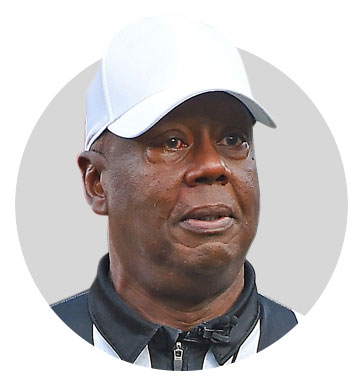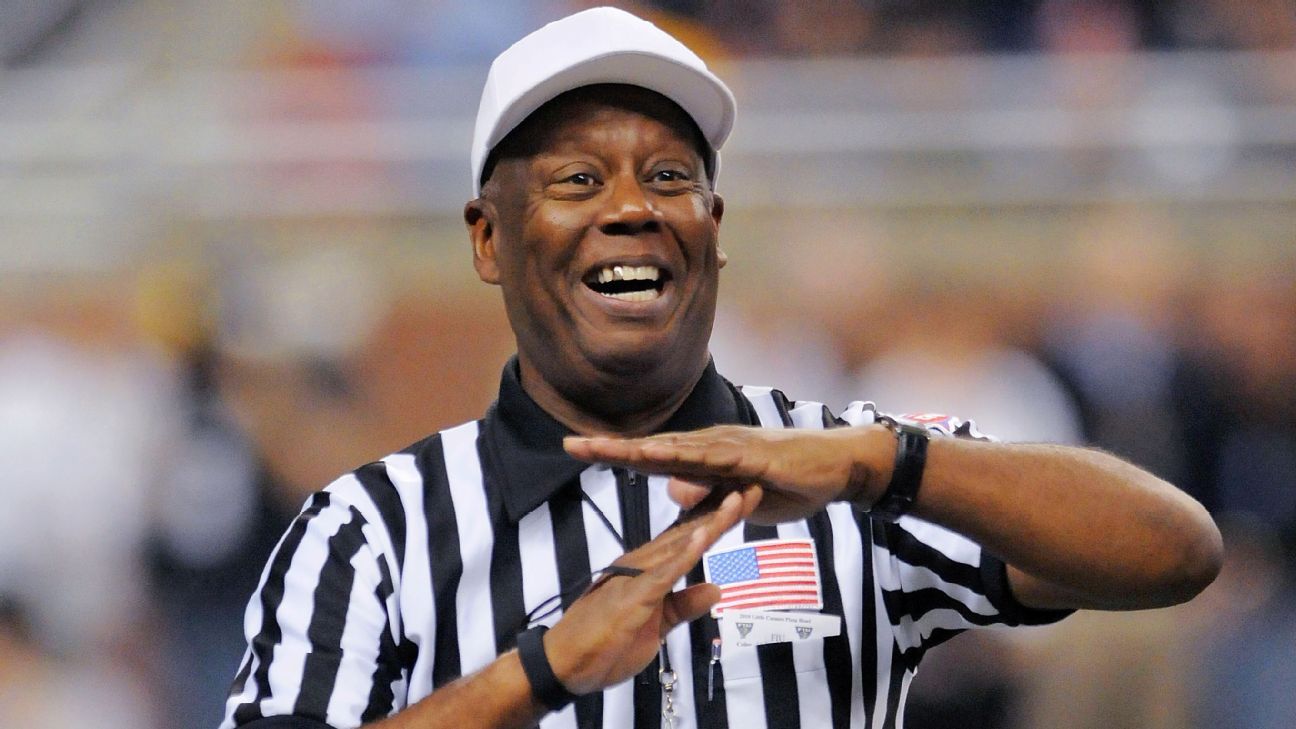
“You’re a football ref, an ordinary man, 60, 65 years old. You’re not making the big millions like the football players, but you’ve got one thing. You’ve got a button on a belt. And you know that all you’ve got to do is click that puppy on and for the first time in your whole stupid life, the entire country is listening to every word that comes out of your mouth.” — comedian Richard Jeni at the 1995 ESPYS
The job of an official is to blend into the scenery. Manage the game, throw the flags and, unless you make a particularly egregious mistake, you’re forgotten. There are moments in every game, however, when the referee flicks a switch on his belt, activating a microphone, and the entire audience — thousands in the stands and perhaps millions more on TV — hang on his every word.
This is the story of how former ACC referee Ron Cherry used one of those moments in an otherwise forgettable 2007 game between Maryland and NC State to make arguably the most famous call in college football history …
Ron Cherry, former ACC referee
Going into Raleigh was always one of my favorite places to officiate a football game. But this was a dreary Saturday, and Maryland was putting the wood to them.
Cherry
We get a little later into the ballgame and I hear someone saying, “Ref, dammit, he can’t do that.” I looked down in the pile and I didn’t see it, but I told the player, “Maybe I missed that.”
Cherry
Sure as hell, a play or two later, they get started again, and this time I saw it. So I threw the flag.
Cherry
I flipped the mic and made the announcement, I just said, “Personal foul, No. 69, offense. He was giving him the business.” … And once you communicate it out, it’s out there and you can’t get it back. And it was out there and got a lot of mileage.
Cherry was in the Air Force when he officiated his first football game. When he was discharged and returned home to Virginia, he took a job with Norfolk Southern railroad and found extra work calling high school games for $2 or $3 a night. “I was on cloud nine,” Cherry said, “because it was an opportunity to be part of the game.” Cherry began his ACC career in 1993 and served as referee for the first time in Georgia Tech‘s 1994 game against Western Carolina, a day so hot Cherry thought he might pass out on the field, and a game so wild that “every penalty in the book, we called.”
Cherry
I came in as a side judge. The second season we had this roundtable meeting in Charlottesville with all the officials assembled. At the end of the meeting, [Brandon Faircloth] walked out and said, “Walk with me, Ron.” I said, “Oh hell, I’m about to get fired.” He said, “Ron, I want to make you a referee.” I don’t know if all the color drained out of my body.
Cherry
I talked to a lot of players, just as I would anybody else. I tried to call them by name if I could, and they called me Ron. It wasn’t “Mr. Ron.” It was, “Hey Ron.” And I was happy with that because it made us equal components in a lot of ways.
Cherry
In the early days, I always wanted to be talking to the television, to the person that’s at home, since they didn’t have the benefit of being here in the stadium, giving them some clarity in a brief, concise way.
Cherry
My girls would tell me, “Daddy, you sound so country,” and I’d say, “What? No way.”
Cherry
We can’t all be clones. I’m over 6 feet, African American, long arms and long legs. There’s not a lot of places I can hide once I get out there. So you accept what you have.
Cherry
I never thought of myself as being anything other than an official. I was doing a job. It wasn’t that I was Ron, the Afro American referee. That wasn’t how I saw myself. I knew that there was not a lot of minorities, when I first started, that had those opportunities. And it wasn’t always easy for me, but if I made it look easy, maybe it would give them some confidence to make them think they could do the same. But it wasn’t just African Americans. It was anybody. I’m just a football official. I don’t have time to sort out all that other stuff, not during this game.
Cherry simply liked people, and because of that, he made friends quickly. Nearly everyone who worked with him has a Ron Cherry story.
Cherry
My personality, you could turn the switch — Clark Kent into Superman and then turn back. I felt like my part was, maybe it’s like a guy who does the news or a disc jockey on a radio station, where every day he’s just happy-go-lucky, which I was. I liked to cut up and mean mug and do all those crazy things, but when it was time to turn the mic on, hell, I can remember thinking, “Why am I looking so serious all of a sudden?”
Cherry
George Bush and his wife were going to walk out to midfield with me and we sat there and talked with the president for more than 30 minutes. … [After the coin toss], I got the coin off the ground and presented it to the president and said, “Thank you for what you do, and thank you for your service.” And this is true. He says, “Right on, brother.” I had goose bumps.
If his colleagues were familiar with his quirks and charm before, the rest of the country learned on Nov. 24, 2007. With Maryland leading 37-0, Cherry flipped on the mic at Carter-Finley Stadium and delivered a call for the ages.
It was second-and-7, and Andre Brown took the pitch for a sweep to the left. Heppe was the pulling guard on the play, and once again, he was met by Barnes in the backfield and then “The business” ensued.
Andrew Redfern, former NC State offensive lineman and Heppe’s roommate
It couldn’t have happened to a more perfect teammate.
Cherry
I had a flashback to the late 1950s and early ’60s, there was a series, “Leave It to Beaver” and Wally always used to tease The Beaver about giving him the business. And without even thinking, I said, “Well, that’s the business down there.”
Cherry
I turned the mic off and thought, “Why are those people laughing up in the stands?” It just didn’t register. Guys in the crew were looking at me and I was thinking, “What the hell is going on?”
Cherry
I wouldn’t throw him out. When you’re in a ballgame, you feel the emotions — the ebbs and flows. To me, it was one of those situations where the foul, in my opinion, the score, the time in the ball game, it wasn’t something I wasn’t going to do.
Cherry
The next morning, we go to the airport, get on the airplane and this lady sitting up front is saying, “That’s him! That’s him! That’s the guy who said ‘Giving him the business.'” I thought, what is she talking about? Because it still didn’t register. I get home and my daughter calls me and said, “Daddy, it’s on YouTube.” And I said, “What is YouTube?”
Cherry
I went to the damn link and said, “Oh s—.” Then it started. People were wearing me out with it.
Cherry
The next morning, I’m in the office, and one of my clients calls and says, “Ron, you’re all over the place.” I said, “It’ll go away by day’s end. Nobody will stay with that thing.” And sure enough my boss calls on the football side of things and asks what was that all about.
Cherry
The next weekend’s assignment, I couldn’t go anywhere — the hotel, restaurants, on the radio they were saying it.
Cherry
I knew Ben from television but I never had occasion to be in his presence. It’s not like a thief in the night or anything. My reaction was pure without any premeditation or thought. When you attempt to premeditate something like that, it blows up on [you].
Cherry
It was one of those situations where you try to use the simplest expression to explain it, and they didn’t know it was unusual, so I said it was unusual and set it up that way.
Cherry
What I remember was being in a dressing room and an ambulance. … I finally went to the hospital] the day after Christmas. I was playing macho man around the house and not letting my family know about it, but I was having trouble.
Cherry
I was going to [retire] the next year anyway, but you get knocked on your ass. I remember going into a deep kind of depression — not because I got hurt, but I didn’t get to say goodbye to the game the way I came in, on my two feet.
Cherry
It took a year and a half, two years — maybe three now — before I finally had enough courage to sit down and look at it. And it just made me cry. Being injured wasn’t it. I had a lot of people to help me recover and get my life back in order. It was more emotional because of not being able to say thank you.
Cherry officiated more than 300 Division I games in his career and helped influence a generation of officials. He helped create opportunities for Black officials, and he continues to work with the ACC to recruit new talent. He remains beloved by coaches, players and his fellow officials, but, for better or worse, he’ll always be best remembered for that one call 15 years ago.
Cherry
If this is a part of my legacy, so it is. But so is everything else — the ton of snaps I saw and officiated. It’s the funny things, the crazy things, the stupid things, the camaraderie. The best thing that ever happened was I got to meet people from all walks — from university presidents to the officiating staff to doctors to lawyers to the FBI. It was just the whole gamut. It was the experience of a lifetime, and to that end, I’m humbled and gracious that I got to wear stripes.












